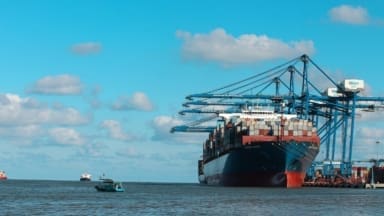
The report, produced by Det Norske Veritas (DNV) assesses the road ahead for shipping, analysing regulations, technologies and fuel availability to aid stakeholders in their decarbonisation processes.
The eighth edition of DNV’s Maritime Forecast to 2050 reveals that the decarbonisation of the maritime industry will incur substantial costs, with container shipping facing the highest increases. According DNV Maritime ‘Forecast to 2050’ the decarbonisation of the maritime industry could see cost increases per unit of transport work of between 69% and 75% for bulk carriers, 70% to 86% for tankers, and 91% to 112% for container vessels.
Driven by regulations, the IMO’s decarbonisation goals (full-scale decarbonisation by or around 2050, 20% emissions reduction by 2030, and 70% reduction by 2040) pressure from cargo owners, financing terms, and societal trends, the shipping industry must look to effective decarbonisation. Regulations such as the EU Emissions Trading System (ETS) and FuelEU Maritime will start to impose costs on emissions, which means that shipping companies must explore every option to reduce fuel consumption.
“Our latest analyses show that decarbonising shipping could double the cost of transporting goods by containers”, said Eirik Ovrum, Principal Consultant and Lead Author of Maritime Forecast to 2050. “Ultimately, the rising costs of seaborne transport will need to be passed down the value chain and the market is already seeing trends towards shifting these costs to end-users.”
“While we are currently witnessing a slowdown of decarbonisation in shipping, we are entering an era of unprecedented technological exploration that will drive progress forward. With carbon-neutral fuels in short supply, smart decision-making and strategic investments today are crucial to lay the foundations for future emissions reductions. Prioritising energy efficiency, leveraging technological solutions, and embracing digitalisation are key steps towards reducing the extra cost burden and achieving our decarbonisation goals,” said, Knut Ørbeck-Nilssen, DNV Maritime CEO.

